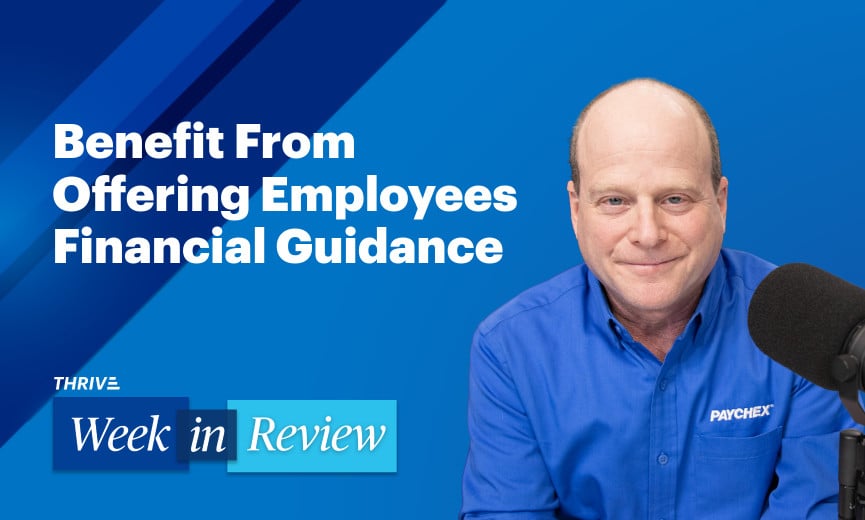- Thrive
-
Season
4Episode61
Jobs Up, Job Openings Up — Despite Use of AI to Cut Jobs — and Commercial Construction Grows

Podcast •

Summary
Unemployment is at a 40-year low as hundreds of thousands of jobs are added in the U.S. with more than 10 million job openings reported in May. Commercial construction spending is also on the rise, so look for opportunities to secure contracts. Also, a survey reveals that half of small businesses want to use AI to cut jobs. Gene Marks says employers should be prepared to offer the right benefits and pay, not to mention the need to stay on top of the latest AI tools to support their goals. Listen to the podcast.
View Transcript
[Gene Marks, host]
Hey, everybody, this is Gene Marks, and welcome to this week's episode of the Week in Review, a Paychex THRIVE Podcast. This is the weekly podcast that we do where we take a few items in the news and we talk a little bit about how they affect your business. So, let's get to it, shall we?
First big item in the news this week — jobs; jobs, jobs, jobs. Last week, the Department of Labor announced that the U.S. added 339,000 jobs in May, and by the way, they also increased the jobs added by about 100,000 in previous months, which is really amazing stuff.
The unemployment rate now is at 3.7 percent, which is more than a 40-year low. I mean, let's just put that into perspective here. We are talking about recession, recession, recession, and yet, you know, what kind of a recession is this when we're when we have such a strong job numbers and such a low unemployment rate?
The Paychex IHS Markit report also mirrored the exact same thing. That is the, you know, monthly report that comes out from Paychex. They reported that the average hourly earnings growth for private non-farm payroll was about 4.3% year-over-year, which is, sorry, a 4.3% year-over-year, which is okay. Still, you know, it's ahead of inflation, which is good news. It declined a little bit, but still, workers are making more money, which is great, and workers have jobs, which is also great, as well.
Related to that is story number two, which has to do with job openings. Job openings increased to 10.1 million. It had been edging down over the past few months, but now it edged back up. There are job openings in all sorts of industries. And, by the way, the industries that are really strong with jobs right now are services and retail and accommodations and leisure. Anybody in the service business, they're just they continue to look for workers.
Yeah, the tech industry is down and suffering some challenges. Manufacturers also are experiencing slow growth. But, you know, when people ask you if there's a recession going on or if a recession is coming, there are certainly a lot of trends that are out there that are concerning high interest rates and again, softness in demand and some other factors. But really, for the most part, everybody, I mean, you know, the job market is strong.
So, what does that mean for you? How does that impact your business? It means this: You still have to be paying very much so paying attention to paying competitive wages. You have to relook at your benefits. Are you offering the big three this year like health care, retirement, and flexibility? And yes, flexibility is part of the big three in job benefits that all employers are offering.
You have to make sure that you're competitive so that you can stay, you know, find that labor, which is still very much in short supply. Many small businesses are looking for employees. So, if you're in that situation, you're certainly not alone. You have to be competitive.
Now, there's another story that came out last week that was interesting. It was a survey that was taken that was reported on pcmag.com that said that almost half of small-business owners plan to cut hiring because of AI. Now, I just told you that we have all these, you know, job openings that are out there and they're going up, but now we're hearing from small business owners, at least in this survey, that, you know, if technology allows them, they will cut hiring.
That's important thing to know both if you're an employee and if you're a business owner. If you're an employee, you need to make sure that you're providing ROI — return on investment — for your employer because employers are looking for ways in a tight job market and maybe a slowing economy and always looking ways to cut overhead. Technology is going to help them do that.
AI — artificial intelligence — as that technology improves and matures over the next few years, it will be doing a lot of the work that current employees are doing, as well. I'm not saying there's going to be massive layoffs because of it. I don't think that will happen, but I do think that will actually impact a lot of hiring and a lot of retaining of employees because AI is going to allow you to get more done with less people in your office.
So, my advice to you when it comes to, you know, this this survey about AI: Look at AI, invest in AI, and talk to your software vendor about what tools they've got coming up that will help you do your work better, quicker, and faster.
Finally, the residential construction market has seen a slowdown in construction spending. Private residential construction spending is down 9.2% this year. However, nonresidential spending — this is commercial spending — is up 31% year-over-year, and public spending is up 16½ % year-over-year.
How does this impact your business? Well, countless small businesses are in the construction industry, performing as contractors and other types of indirect services. Very, very important to make sure that you are staying, you know, aware of where the trends are going in this industry.
If you are, you know, you're doing your work with residential construction people, homes, and houses. Well, you know, rising mortgage rates are certainly having their impact on that market. So, it's the commercial buildings, warehouses, and other industrial facilities. They're seeing the boom right now and from the government, as well. Lots of public spending going on thanks to the infrastructure bill from 2021. So, that's where you follow the money.
If you're in the construction business, look toward commercial construction and look for government construction, as well, and government projects this year, although I'm sure private residential construction will rebound in the years to come.
So, let's recap the news for this week. Strong jobs mean you've got to be on top of your game when it comes to attracting and retaining people because it's still a very tight labor market with even an increase in job openings.
Be aware that many business owners are looking to AI to cut jobs or at least minimize their payrolls as much as they can, and so should you. Talk to your software vendors about what AI tools they're coming out with so that you can use them to be as efficient as possible in your business.
And finally, in the construction industry, residential spending is down, but commercial spending is up significantly and so is government spending. So, if you're a contractor or business in the construction industry, focus on commercial work and focus on government work — at least for the next year or two. You'll see, I'm sure, private residential construction will turn itself around, but that's where you want to go to follow the money.
You've been listening to the Week in Review podcast, a Paychex THRIVE podcast. My name is Gene Marks. I hope you found this information helpful. Hey, if you need to advice or tips or would like to suggest a guest for our podcast, please visit us at payx.me/thrivetopics.
Again, thanks for listening. I'll be back to you next week with some more news that impacts your business and how it impacts your business. We'll talk about all that stuff. Take care.
This podcast is property of Paychex, Inc. 2023. All rights reserved.

 Apple Podcast
Apple Podcast Spotify
Spotify iHeartRadio
iHeartRadio








